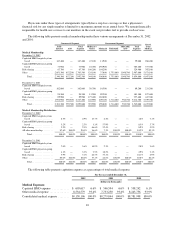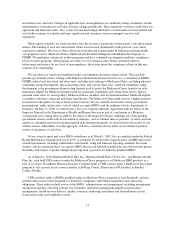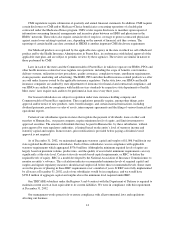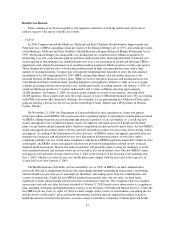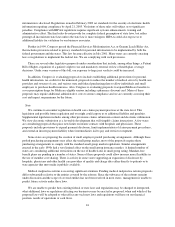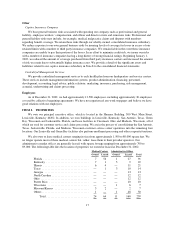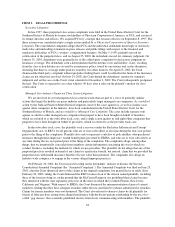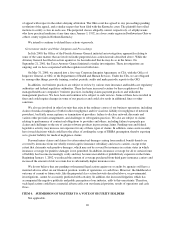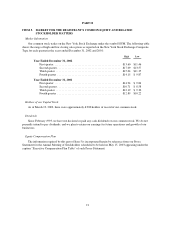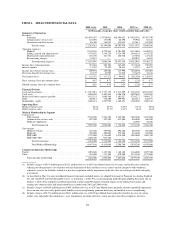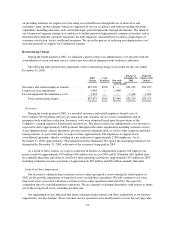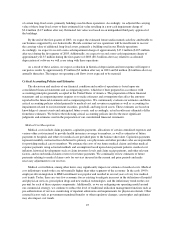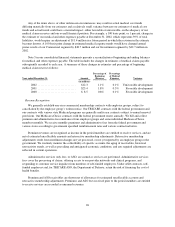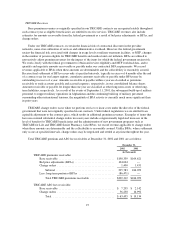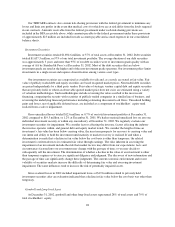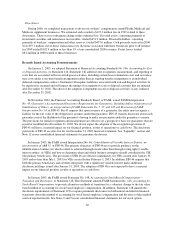Humana 2002 Annual Report Download - page 26
Download and view the complete annual report
Please find page 26 of the 2002 Humana annual report below. You can navigate through the pages in the report by either clicking on the pages listed below, or by using the keyword search tool below to find specific information within the annual report.of appeal with respect to the orders denying arbitration. The Ohio court has agreed to stay proceedings pending
resolution of the appeal, and a similar request has been filed with the Kentucky court. The plaintiffs have filed
motions to certify a class in each case. The purported classes allegedly consist, respectively, of all physicians
who have practiced medicine at any time since January 1, 1992, in a four county region in Southwestern Ohio or
a three county region in Northern Kentucky.
We intend to continue to defend these actions vigorously.
Government Audits and Other Litigation and Proceedings
In July 2000, the Office of the Florida Attorney General initiated an investigation, apparently relating to
some of the same matters that are involved in the purported class action lawsuits described above. While the
Attorney General has filed no action against us, he has indicated that he may do so in the future. On
September 21, 2001, the Texas Attorney General initiated a similar investigation. These investigations are
ongoing, and we have cooperated with the regulators in both states.
On May 31, 2000, we entered into a five-year Corporate Integrity Agreement, or CIA, with the Office of
Inspector General, or OIG, of the Department of Health and Human Services. Under the CIA, we are obligated
to, among other things, provide training, conduct periodic audits and make periodic reports to the OIG.
In addition, our business practices are subject to review by various state insurance and health care regulatory
authorities and federal regulatory authorities. There has been increased scrutiny by these regulators of the
managed health care companies’ business practices, including claims payment practices and utilization
management practices. We have been and continue to be subject to such reviews. Some of these have resulted in
fines and could require changes in some of our practices and could also result in additional fines or other
sanctions.
We also are involved in other lawsuits that arise in the ordinary course of our business operations, including
claims of medical malpractice (both for direct negligence and for vicarious liability for negligence of network
providers), bad faith, nonacceptance or termination of providers, failure to disclose network discounts and
various other provider arrangements, and challenges to subrogation practices. We also are subject to claims
relating to performance of contractual obligations to providers and others, including failure to properly pay
claims and challenges to the use of certain software products in processing claims. Pending state and federal
legislative activity may increase our exposure for any of these types of claims. In addition, some courts recently
have issued decisions which could have the effect of eroding the scope of ERISA preemption, thereby exposing
us to greater liability for medical negligence claims.
Personal injury claims and claims for extracontractual damages arising from medical benefit denials are
covered by insurance from our wholly owned captive insurance subsidiary and excess carriers, except to the
extent that claimants seek punitive damages, which may not be covered by insurance in certain states in which
insurance coverage for punitive damages is not permitted. In addition, insurance coverage for all or certain forms
of liability has become increasingly costly and may become unavailable or prohibitively expensive in the future.
Beginning January 1, 2002, we reduced the amount of coverage purchased from third party insurance carriers and
increased the amount of risk we retain due to substantially higher insurance rates.
We do not believe that any pending or threatened legal actions against us or audits by agencies will have a
material adverse effect on our financial position, results of operations, or cash flows. However, the likelihood or
outcome of current or future suits, like the purported class action lawsuits described above, or governmental
investigations, cannot be accurately predicted with certainty. In addition, the increased litigation, which has
accompanied the negative publicity and public perception of our industry, adds to this uncertainty. Therefore,
such legal actions could have a material adverse effect on our financial position, results of operations and cash
flows.
ITEM 4. SUBMISSION OF MATTERS TO A VOTE OF SECURITY HOLDERS
Not applicable.
20


